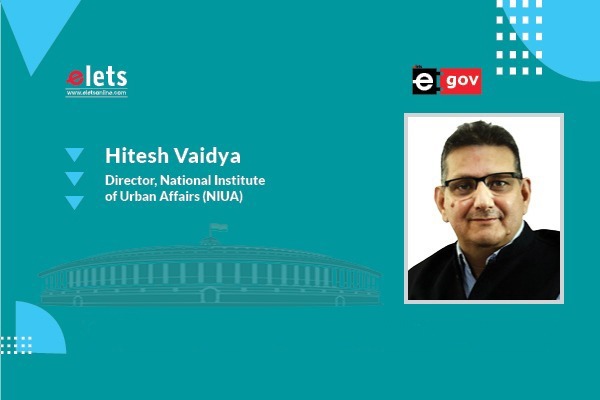
Hitesh Vaidya
Director, National Institute of Urban Affairs (NIUA)
The World Environment Day, celebrated on 5th June, is the largest global platform for encouraging awareness and action for the protection of the environment. This year the World Environment Day 2022 theme is – ONLY ONE EARTH, with the focus on “Living Sustainably in Harmony with Nature”. It includes the urgent need for actions towards a healthy planet and prosperity for all, achieving a sustainable and inclusive recovery from the COVID-19 pandemic, and accelerating the implementation of the environmental dimension of Sustainable Development Goals (SDGs). Also, the World Environment Day 2022 is a historic milestone for global communities as it commemorates the 50th anniversary of the Stockholm Conference (1972).
At a global level, India has announced to reach net-zero emissions by 2070 at the COP26 UN Climate Change Conference held in Glasgow. India is at the front in addressing climate actions and has adopted a multifaceted strategy to address climate instability and achieve the SDGs. The country has been ranked as a high performer in the Climate Change Performance Index 2020 on account of low levels of per capita emissions and energy use. Under the Nationally Determined Contributions (NDCs) of the UNFCCC, India’s climate action strategies emphasise clean and efficient energy systems, resilient urban infrastructure, and planned eco-restoration among others. Indian cities are highly exposed to climate risks and are critical sites of climate action. In India, the challenges of climate change and sustainable development are particularly critical. By 2050, 53 per cent of India’s population will be living in urban areas. There are cities which are experiencing an increase in extreme rainfall and exacerbated flood risk, precipitation decline, droughts, heatwaves, the spread of vector-borne diseases, and heat-related deaths.

Owing to the climate-related risks and vulnerabilities, urban local bodies (ULBs) have led to a focus on identifying and implementing climate change adaptation in cities. Many Indian cities such as Mumbai, Coimbatore, Rajkot, Siliguri, and Udaipur are developing climate action plans to adapt to increasing risks such as flooding and heat waves and to mitigate greenhouse emissions.
While the country is on track with regard to policy interventions, there is a growing need for developing solutions based on a sound understanding of sustainable development.

This issue is a compilation of six articles and an interview to mark World Environment Day, and accelerate actions towards achieving environment-related SDGs by 2030. The Sustainable Development Goals are integrated and balance the three dimensions of sustainable development (economic, social, and environmental). The interlinkages and integrated nature of the SDGs are of crucial importance in ensuring that the purpose of the New Urban Agenda and combating climate is realised.
NIUA is committed to contributing to Indian cities perform better. To achieve this objective, along with our own resources, we partner with media, industry, academia and other government and non- government organisations (NGOs) for effective research, capacity-building, and advocacy outcomes. The collaboration of the NIUA and eGov magazine is a demonstration of the same. Teams at NIUA and eGov magazine have enthusiastically worked to collate a diverse range of knowledge-base on the cross- cutting issues of climate change, technology and SDGs in India for this special issue. My sincere thanks to all the authors who have contributed to this special issue and shared their knowledge to make this issue possible.
Be a part of Elets Collaborative Initiatives. Join Us for Upcoming Events and explore business opportunities. Like us on Facebook , connect with us on LinkedIn and follow us on Twitter, Instagram.











